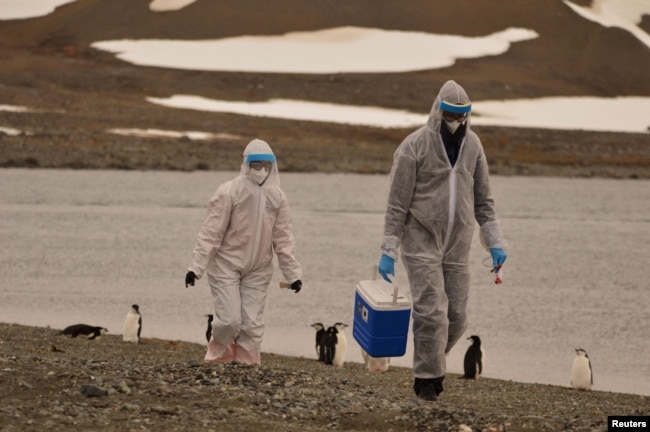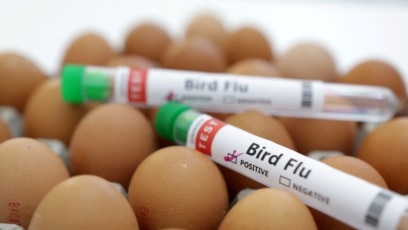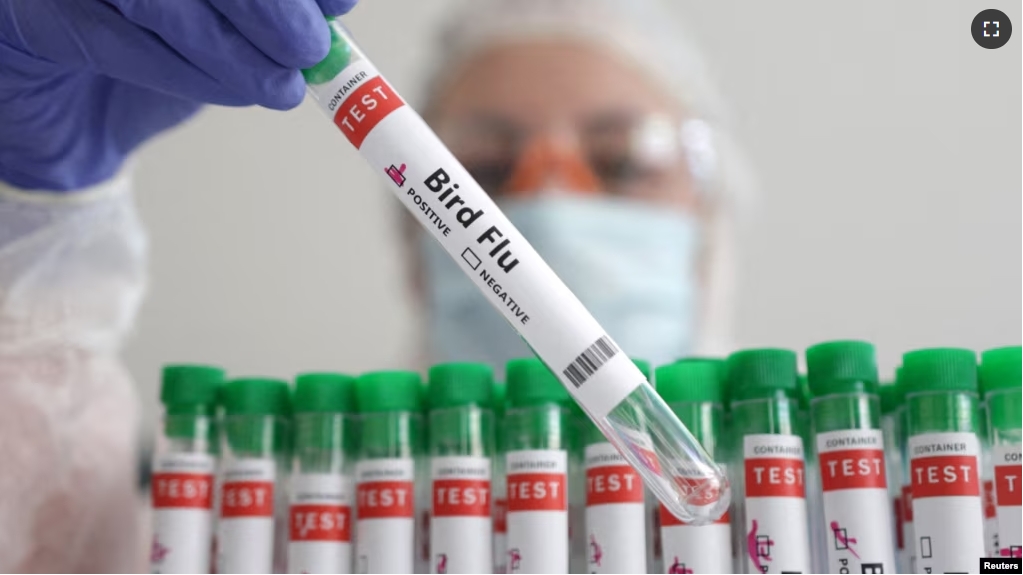From VOA Learning English, this is the Health & Lifestyle report.
Scientists are testing next-generation vaccines to deal with the spread of bird flu in the United States. The vaccines use the same mRNA technology that led to the development of COVID-19 shots in record time.
The U.S. Agriculture Department is planning to test a vaccine, developed by University of Pennsylvania researchers, by giving it to cows in order to protect farm workers. They say this could lessen the chance for the virus to jump into people and mutate, or change, in ways that could cause human-to-human spread.
Meanwhile, officials at the U.S. Department of Health and Human Services have been talking to drugmakers about possible mRNA flu vaccines for people. These mRNA vaccines would be in addition to the millions of bird flu vaccines already in government hands.
“If there’s a pandemic, there’s going to be a huge demand for vaccine,” said Richard Webby, a flu researcher at St. Jude Children’s Research Hospital in Memphis. The more vaccines, the better, he added.

Spread of bird flu virus
Since 2020, the bird flu virus has been spreading among different kinds of animals in many countries. In March, it was found in U.S. dairy cows. However, investigators think it may have been in cows since December. Recently, the USDA announced it had been found in alpacas for the first time.
At least three dairy farm workers in the U.S. have been diagnosed with bird flu. Their illnesses were not severe. But earlier versions of the same H5N1 flu virus have been deadly to humans in other parts of the world. And U.S. officials are taking steps to be prepared if the virus mutates to a deadlier version or permits it to spread more easily from person to person.
Health officials say they already have two candidate vaccines for people that appear to be well-matched to the bird flu virus in U.S. dairy cows. They say, hundreds of thousands of prepared vaccines could go out immediately. And nearly 10 million more treatments could be produced in a few months.
The drugmaker CSL Seqirus said the U.S. government hired it to fill and finish about 4.8 million shots that could be completed by late summer. But the production lines for flu vaccines are already working on this autumn’s seasonal shots. And drugmakers would have to stop the lines to produce the bird flu vaccine.

Looking for a faster pathway
So, the government has been looking for another, faster pathway: the mRNA technology used by drugmakers Moderna and Pfizer to produce the vaccines against COVID-19.
Vaccine makers usually add elements of an inactive or weakened virus to the shot mixture. But with mRNA vaccines, scientists instead create a genetic material to direct the human body to produce antibodies and recognize and destroy the virus.
Moderna already has a bird flu mRNA vaccine in very early testing in humans. In a statement, Moderna said they “are in discussions with the U.S. government on advancing our pandemic flu candidate.”
Similar work has been going on at Pfizer. Company researchers in December gave human volunteers an mRNA vaccine against a version of bird flu that is somewhat similar to the one in cows.
Since then, researchers have performed a lab experiment exposing blood samples from those volunteers to the version seen in dairy cows. Pfizer said in a statement that they saw “notable increases in antibody responses.”

As for cows, University of Pennsylvania researcher Scott Hensley worked with Nobel-prize winner Drew Weissman on an experimental vaccine similar to the Moderna one for people.
In first-step testing, mice and ferrets produced high levels of bird flu virus-fighting antibodies after vaccination.
In another experiment, researchers infected one group of ferrets after vaccination. Then they compared what happened to unvaccinated ferrets. All the vaccinated animals survived and the unvaccinated did not, Hensley said.
“The vaccine was really successful,” said Webby of St. Jude Children’s Research Hospital in Memphis. His lab did that work last year in partnership with Hensley.
The cow study will be similar to the early testing done in smaller animals. The plan is for about 10 small cows to be vaccinated, half with one shot and half with another. Then their blood will be examined to look for how much bird flu-fighting antibodies were produced.
Hensley said that if a vaccine reduces the amount of virus in the cow, “then ultimately we reduce the chance that a mutant virus that spreads in humans is going to emerge.”
That’s the Health & Lifestyle report.
I’m Anna Matteo.
And I’m Andrew Smith.
Mike Stobbe and Lauran Neergaard reported this story for the Associated Press from. Anna Matteo adapted it for VOA Learning English.
Quiz – Scientists Test mRNA Vaccines to Protect Against Bird Flu

Start the Quiz to find out
______________________________________________
Words in This Story
mutate – v. to cause to undergo changes at the genetic level (mutation)
dairy – n. milk from a cow or other domestic animal (such as a goat)
diagnose – v. to recognize (something, such as a disease) by signs and symptoms
advance – v. to bring or move forward
sample – n. a part (as a set of individuals chosen from a whole population) used for investigating the whole
response – n. a reaction of a living thing to a stimulus
ultimately – adv. in the end
emerge – v. to become known or apparent
